Reconnecting with Roots: A Systematic Malayalam Language Classes for the Malabari Community in Malaysia
Madrasah al-Irsyadiah Pelangi Indah, a Malabari madrasah in Malaysia, in collaboration with the Centre for Public Education and Training (CPET) at Darul Huda Islamic University, Kerala, has introduced a Malayalam language course in Malaysia. This specialised program is designed for the Malabari Muslim community in the country. The course launched in Malaysia is the first and only CPET program dedicated to teaching the Malayalam language to individuals living abroad. An academic certificate from Darul Huda Islamic University, Kerala is given to the students who complete this course. This bilateral partnership commenced through a Memorandum of Understanding (MoU) between Madrasah al-Irsyadiah and CPET, extending CPET's academic and da’wah initiatives in Malaysia.
Objectives
The primary aim of this course is to foster a Malaysian Malabari Muslim community expert in speaking, reading, and writing Malayalam fluently. It also seeks to preserve the identity and heritage of Malabari Muslims in Malaysia, who are experiencing sociocultural assimilation with the local community. Hence, learning the mother tongue is considered an essential step towards safeguarding this identity.
Opening Ceremony
The program's inauguration was held online via Google Meet on Wednesday, 28 February 2024, at 9:45 PM Malaysian Time. The event, organised by Madrasah al-Irsyadiah, was officiated by Sayyid Abbas Ali Shihab Thangal Panakkad, and opening remarks by Prof. Dr. Bahauddeen Muhammed Nadwi, Vice-Chancellor of Darul Huda Islamic University, and a welcome speech by Dr. Rafeeq Hudawi Karimpanackal, Registrar of Darul Huda Islamic University. Representatives from Madrasah al-Irsyadiah, including its Chairman, Hj. Yusuf Ali bin Hj. Mohamed, and Deputy Chairman, Ustaz Rafi bin Abdurahman, alongside members of the public, who graced the occasion.
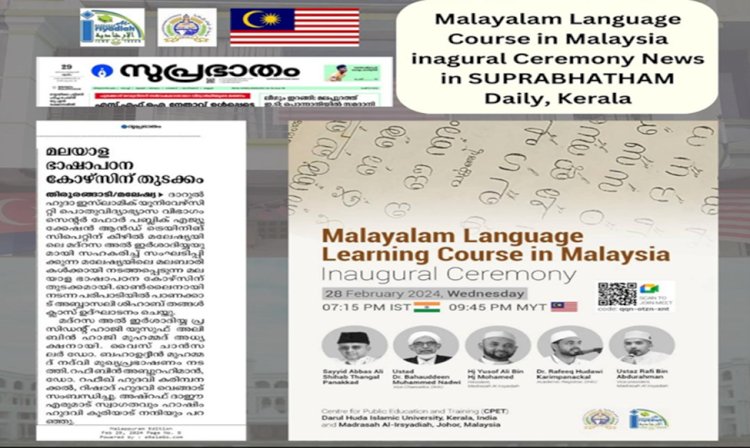
Photo: News Report about the launching of the program
Several academic programs have been planned to enhance Islamic education and Malabari culture in Malaysia via Madrasah al-Irsyadiah, collaborating with CPET of DHIU. One significant milestone is the Malayalam language course, launched on 6 February 2024, with 23 online participants. Most students are able to speak the Malayalam Language fluently but face challenges with assimilation, often blending Malayalam with Malay, English, and Tamil. This is because the Malabari Muslim community are the fourth-generation descendants of migrants from Malappuram and Kasargod. Besides that, no institutions in Malaysia currently offer Malayalam language courses.
Syllabus and Teaching Methods
The four main skills taught in this class are listening, reading, writing, and speaking. The curriculum and scriptwriting textbook have been prepared by CPET Darul Huda. However, the syllabus has been modified to incorporate elements of Malay, the official language of Malaysia, and English. These modifications make it easier for students to master the Malayalam language. The method of teaching Malayalam language using the local language of a foreign country is a unique way of teaching. In Malaysia, we teach Malayalam using the Malay language, which is our official language. This teaching method can be analysed, observed and tested as an academic researcher’s topic for dissertations at masters and doctorate levels. The aim is to propose this teaching approach, the 'Mix Method Malayalam Language Learning,' for the Book of Records Malaysia.
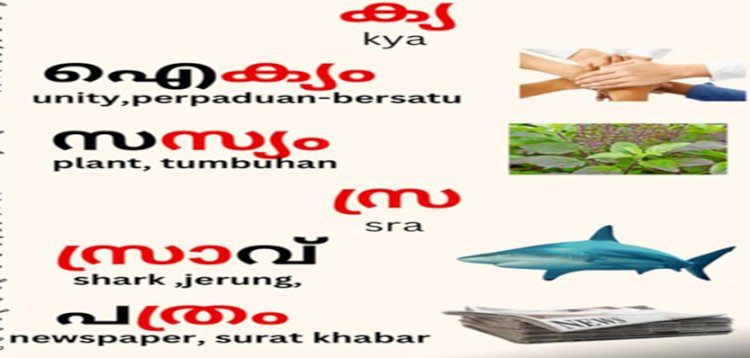
Photo: A model for teaching Malayalam words for Malabari Malays
The classes are conducted online for two hours per week on Tuesdays and Wednesdays, from 9:45 PM to 10:45 PM. The classes are led by Ustaz Rishad Hudawi and Ustaz Nasar with assistance from Ustaz Asyraf Da’ee and Ustaz Rahman Rahmani.
A WhatsApp group for the Malayalam class was initially created to share class information. Weekly lesson notes were uploaded to the WhatsApp group prior to the commencement of the class. Students printed the lesson notes before the class begins. Online teaching is conducted based on the weekly notes.
The first half-hour is dedicated to teaching writing, while the second half-hour focuses on communication in Malayalam with Malay translations. During the writing lessons, students are taught the methods of letter formation, common errors in letter writing, pronunciation techniques, and the use of letters within Malayalam vocabulary.
The second half-hour focuses on communication in Malayalam, based on conversational themes such as "myself," "my family," conversations at the madrasah, and similar topics. During the daily conversation lessons, students are also trained to enrich their vocabulary by being introduced to synonyms and antonyms of the words they learn. Students are coached to construct easy and simple sentences. Additionally, they are assigned writing exercises and are required to submit their written work for the teacher’s review.

Photo: A model for teaching Malayalam sentences for Malabari Malays
Additionally, a digital revision system has also been provided. The instructors have prepared simple three-minute videos for quick revision. Apart from sharing materials during the classes, these short videos are also shared to the public on YouTube, WhatsApp, and Instagram. Videos such as "quick number counting" from one to ten and "rapid colour naming" in Malayalam have received praise from the Malabari community in Malaysia.
Student Feedback
The Program Coordinator, Dr. Abdul Hamid Moiden, consistently seeks feedback from both teachers and students to improve the quality of teaching and learning. Additionally, his two visits to CPET Darul Huda have provided huge opportunities for discussions and improvements to the existing program.
The Chairman of Madrasah al-Irsyadiah, Hj. Yusuf Ali bin Hj. Mohamed, explained that the idea to introduce Malayalam classes arose because the younger generation in Malaysia are not fluent in speaking or reading the Malayalam language. Therefore, one way to foster a sense of Malabari identity and preserve this heritage was the awareness to introduce online Malayalam classes for the Malabari community in Malaysia. He hopes that the next program with CPET Darul Huda will include Islamic Studies, books, and Qasidas in Malayalam, such as those about the Prophet Muhammad (SAW), Sheikh Abdul Qadir Jailani, Sheikh Ahmad Rifai, Syed Alawi Mauladdawilah, and Sultan-Ul-Khind Khawaja Moinuddin Chishty Ajmeeri, to be taught to Malabari children in Malaysia in the Malayalam language.
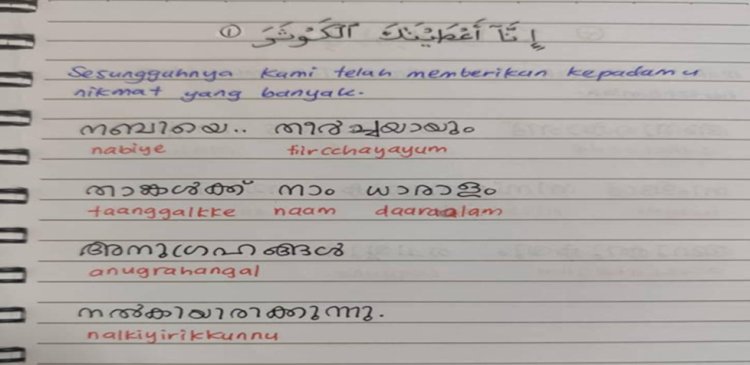
Photo: A model for teaching Malayalam sentences for Malabari Malays
According to Siti Nur Hidayah Kunjumaha, she is very proud to learn Malayalam, which is her mother tongue, as this language is not available at any other school or educational centre in Malaysia. She is now able to communicate in Malayalam easily with her children and relatives residing in Kerala. Furthermore, she mentioned that through this class, she has come to understand the role and function of Darul Huda.
According to Said Ali bin Abu Bakar, he praised the efforts of Madrasah al-Irsyadiah and CPET Darul Huda. He frequently uses Malayalam with his wife, child, and mother only. After the introduction of the Malayalam class, his daughter Aisyah, who mostly uses Malay at home, began speaking more in Malayalam. Said suggested that parents play a key role in using Malayalam at home to encourage family members to do the same. He also recommended that CPET Darul Huda and Madrasah al-Irsyadiah offer Quran courses with Malayalam translations.
According to Puan Beevi binti Othman, she has several acquaintances from Kerala, and in the past, when her friends shared written content on WhatsApp status or sent messages to her WhatsApp, she was unable to read them. After attending the class, she is now able to read the content that her friends share on WhatsApp. She frequently visits Kerala, and this time she is confident that she can read the writing on signboards and communicate more confidently when in Kerala. She is familiar with CPET and understands the certificates issued for students who complete their studies with high status. She is delighted and proud because the invited guests spoke in Malayalam during the closing ceremony of the Malayalam language class.
Syahirah Dayana binti Aida Ros suggested extending the learning duration and creating a communication training platform with the teachers, so that students can practice communicating with the teachers. Abdul Rahman Bin Musa proposed that in the upcoming classes, students should be provided with additional tutorials, especially for those who find it difficult to master writing in Malayalam.
Hopes and Suggestions
My personal opinion as the program coordinator is that this course has successfully achieved its vision and mission. The students have become proficient in reading and writing Malayalam fluently. They are still maintained in the WhatsApp group, where various reading materials and updates on developments in Kerala are shared for the students' reading. The students in this group are now known as 'Malayalam Language Class Alumni.' This alumni group will serve as a support network to assist the 'second batch.
Some students from the ‘first batch’ will be selected to teach several slots in the ‘second batch’.
A mini dictionary of 1000 Malayalam-Malay words, a daily communication book, translations of the stories of Kerala’s scholars into Malay, an introductory article on the history of University Islam Darul Huda, and the history of Mampuram Thangal are currently being worked on in Malay. These materials will be used as reference resources for current Malayalam language students as well as new students who will register later in May 2025.
My mission is to cultivate Malayalam language instructors within the Malabari Muslim community in Malaysia and to produce several publications as supplementary materials.
Furthermore, if CPET Darul Huda provides short-term courses lasting one week or ten days specifically for students in Malaysia who have participated in the Malayalam classes at Darul Huda, it is certain that some students will travel there to further expand their knowledge of the Malayalam language. Additionally, my hope is for CPET to organise workshops, seminars, and online presentations periodically for the Malabari Muslim community in Malaysia. We have high hopes on Darul Huda Islamic University and CPET.
Furthermore, I am pleased that we in Malaysia have provided a small platform through Madrasah al-Irsyadiah for Darul Huda Islamic University to spread the vision of Haji U. Bapputty to propagate dakwah to all corners of the world.
Closing Ceremony

Photo : Ceremony for the Distribution of Completion Certificates for the Malayalam Language Course in Malaysia
The closing ceremony of the Malayalam Language Course was held on 26 November via Google Meet. The event was attended by representatives from Madrasah al-Irsyadiah, Darul Huda Islamic University, Malayalam language students, and members of the public. The ceremony was honoured by the presence of Dr. Sayyed Mohamed Muhsin Hudawi Thangal, Assistant Professor at the Department of Fiqh and Usul al-Fiqh at the International Islamic University Malaysia, who recited the closing prayer. He has consistently provided moral support at numerous events organised by Madrasah al-Irsyadiah in Johor. Dr. Sayyed Mohamed Muhsin is also an alumnus of Darul Huda Islamic University.
About the author:
Dr. Abdul Hamid Moiden is a distinguished educator, writer, researcher, and poet. His areas of expertise include the Malay language, the official language of Malaysia, as well as the Malabari Muslim diaspora in Malaysia, the evolution of their educational system, cultural assimilation among Malabari Muslims, and creative writing, particularly in the form of poetry. Recently, he was appointed as an adjunct professor at Darul Huda Islamic University, Kerala, India, to introduce and promote the Malay language. Dr. Moiden has authored 27 scholarly books, including the widely-referenced Daily English-Malay Conversation and Quick Malay for Beginners, which have become essential resources for many international students in Malaysia.
Disclaimer
The views expressed in this article are the author’s own and do not necessarily mirror Islamonweb’s editorial stance.

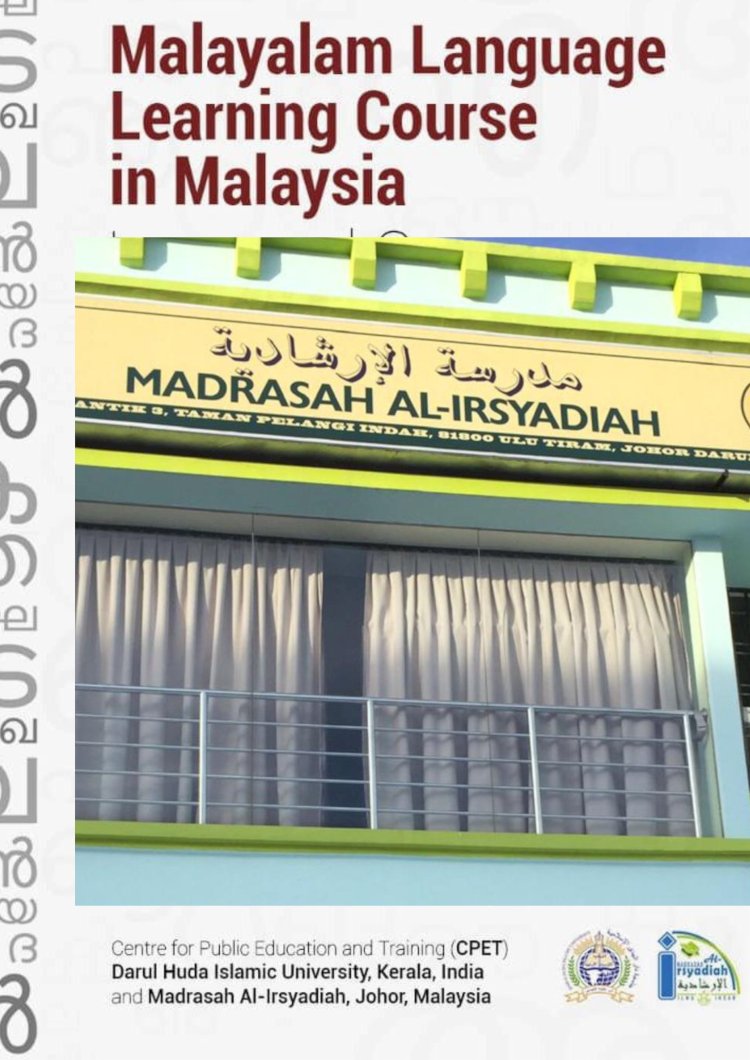


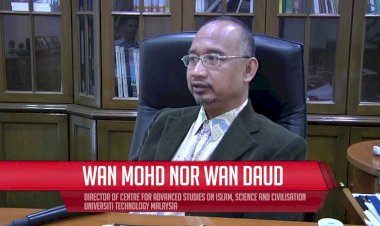
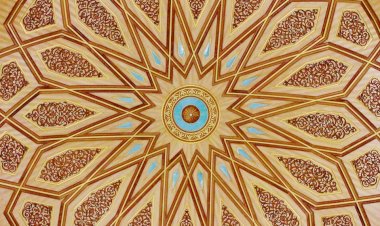

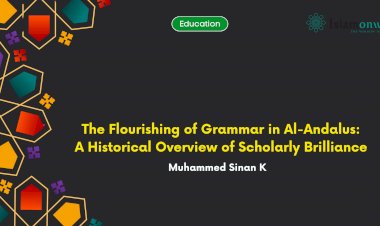
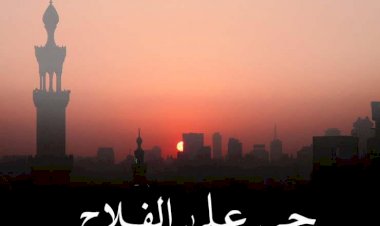















Leave A Comment